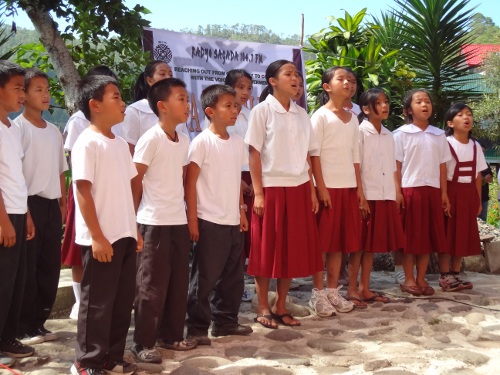
Photo by Isis International.
Launching of the First Community Radio in the Cordillera Region of the Philippines
Sagada, a small town in the mountainous area of Northern Philippines, launched the first community radio in the Cordillera region. Radyo Sagada 104.7 FM, Reaching Out from Community to Community with the Voice of Empowerment, on the significant date of 11 November 2011 or 11.11.11. The celebration was attended by almost one hundred people of the community. Taking place on the grounds of Café St. Joe next to the radio station, the launching was also aired live. At the same time, the speakers in the premise reached as far as the market area of the town centre.
The idea of Radyo Sagada goes back to 2001. Since the formal conception of Radyo Sagada in 2007, Isis International has been supporting and working with the community towards this realisation. Isis International conducted the radio skills and community radio management training; as well as helped in finding funding sources. To this date, Bianca Miglioretto, an Isis International Associate based in Switzerland and former Communication Officer of Isis, continuous to be the consultant of Radyo Sagada’s implementers and partners. Radyo Sagada is one of the few indigenous community radio stations in Asia Pacific that is a member of the World Association of Community Radio (AMARC).
The launching included guest speakers from the local government as well as Radyo Sagada’s partners and affiliates. All acknowledged the important role that the community radio plays in the region, for its many listeners where the station receives up to 300 mobile phone text messages for dedications, comments music, requests and questions each day. It was also acknowledged that the reach of Radyo Sagada has gone far beyond Sagada to its neighbouring municipalities.
The representative of the Provincial Governor, acknowledged the importance of Radyo Sagada for a region that is prone to disasters such as typhoons causing landslides and the loss of electricity. He said that the radio contributes in informing and delivering news and up dates to the people during these times of crisis.
The Isis International associate Bianca Miglioretto was awarded a plaque of recognition for her valuable contribution. In her speech, Bianca talked about the uniqueness of community radio compared to public or commercial radios.
“Community Radio is the voice of the people, it belongs to the people, it is managed by the people and the broadcasters come from the basic masses.” Bianca also acknowledged that compared to public radios that receive government funding or commercial radios that have their numerous commercial sponsors; community radio is not rich. However, Bianca continuous, “…community radios are rich in experiences, rich in different stories from the communities, rich in volunteers and in their many talents, rich in local cultures and tradition, rich in languages, and rich in empowering the people: the women, the children, the farmers…”
However, “…all this richness cannot be paid by money and of course Radio Sagada needs money too…” Bianca goes on to say.
She challenged the audience, those both physically present and its listeners by crying out, “Are you ready to support Radyo Sagada?” In particular, Bianca directed the question to the provincial government, reiterating his acknowledgment of the importance of Radyo Sagada during times of natural disasters. She raised the issue of Radyo Sagada needing an emergency power supply system so that during electricity cuts the radio may continue to serve the community by broadcasting warnings and up dates. She called on the Provincial Government, “Are you ready to support Radyo Sagada by providing the funds needed for Radyo Sagada to aquire an emergency source of power?” With slight hesitation, the representative of the Provincial Governor nodded in agreement.
Equally important, Bianca spoke about the role of community radio for women’s empowerment. While Radyo Sagada has many women broadcasters and a female Station Manager, it does not yet have a women’s programme. Bianca emphasised that an important role of community radio broadcasters is to empower women of the society.
“To inform them about their rights such as reproductive rights and right to education; so that women can make informed choices in their lives.”
Radyo Sagada is run by a staff of three and approximately twenty volunteers from the different sectors of the community including, students, women, local government, business, church, and NGOs. Sagada is tourist destination and Radyo Sagada has taken advantage of this by inviting some tourists who may be experts in various development fields to be interviewed. For instance, one foreign visitor is scheduled to speak on solid waste management.
Because of its far reaching capacity and many listeners, a senior farmer from the neighbouring municipality of Besao visited Radyo Sagada after hearing them on air and offered to play live his traditional bamboo violin which is no longer commonly used.
Isis international is confident that Sagada Community Radio will reach far, particularly in empowering the community even in the face of the many challenges it faces. The radio allows for the crossing of distances. Sagada is located in the Mountain Province where travel from one municipality to the next can be long and difficult. Through radio, people are able to greet and celebrate special occasions with relatives and friends. Yet, one of its challenges would be in how Radyo Sagada will be able to serve and ensure the active participation of its neighbouring municipalities. One way that has already been discussed is to establish local broadcastings teams that air their programmes from the different municipalities. Indeed, community radio can bring people closer.





 The
The 
 Isis Resource Center holds one of the largest feminist collections of materials in the Global South. With 40 years of publication experience, Isis holds a vast collection.
Isis Resource Center holds one of the largest feminist collections of materials in the Global South. With 40 years of publication experience, Isis holds a vast collection.